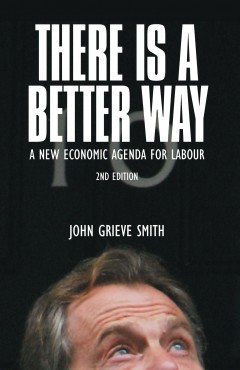There is a Better Way
A New Economic Agenda for Labour
By John Grieve Smith
Other Formats Available:
- About This Book
- Reviews
- Author Information
- Series
- Table of Contents
- Links
- Podcasts
About This Book
In this critical account of New Labour's economic and welfare policies in their first two terms in office, John Grieve Smith suggests that, far from pursuing any radical new agenda, they have been actively consolidating the Thatcherite Revolution. If Labour is to offer a genuine alternative to the Tories, and achieve its long standing objective of a fairer society, radical developments in policy are needed. John Grieve Smith discusses the policies needed to ensure expansion and full employment here and in the rest of the European Union. He examines the whittling away of pensions and other social security benefits, and the growing reliance on means testing, together with the need for higher and more progressive taxation if the quality of health and education services is to be improved. The greatest challenge of coming decades is to develop more effective global and regional international institutions in the economic and other fields. Here the author puts forward a programme of major reforms of the global financial system to make both developing and industrialized countries less vulnerable to the instability of financial markets. This new and updated edition of John Grieve Smith's lively and controversial book is a timely contribution to current political debate.
Reviews
'An outstanding critique of New Labour's economic and social policies.' —William Keegan, Economics Editor and Associate Editor, 'The Observer'
Author Information
John Grieve Smith is a Cambridge economist with wide experience of government and history. He has worked in the Cabinet Office, the Treasury, as an Under-Secretary in the Department of Economic Affairs and then as Director of Planning in the British Steel Corporation. He is a fellow of Robinson College, Cambridge.
Series
Table of Contents
Prefaces, Acknowledgements; 1. The New Orthodoxy: 1. Introduction; 2. Evolution of Post-War Policy; 3. The New Orthodoxy; 4. New Labour in Power; 5. Restoring Full Employment; 2. A Fairer Society: 1. Social Injustice; 2. The Balance of Power; 3. Industry and Social Partnership; 4. The Public Sector; 5. Paying for Public Services; 3. The Welfare State: 1. The Growth of Means-Testing; 2. New Labour's Inheritance; 3. Welfare Reform; 4. The Demographic Time Bomb; 5. Time to Take Stock; 4. The Future of the EU: 1. Further Integration; 2. Managing Demand; 3. Taxes and Public Expenditure; 4. The Labour Market, 5. A European Federation?; 6. Rethinking European Policy; 7. A New ERM; 5. Reforming the Global Financial System: 1. The Threat of Instability; 2. Improving Financial Regulation; 3. The Flow of Capital to Developing Countries; 4. The Role of Taxation; 5. Managing Exchange Rates; 6. The Future of International Economic Institutions; 6. A New Economic Agenda: 1. Breaking the Thatcherite Mould; 2. Towards a Fairer Society; 3. Rebuilding the Welfare State; 4. Making European Integration Work; 5. Taming Global Finace; 6. A Better Way; Index
Links
Stay Updated
Information
Latest Tweets



